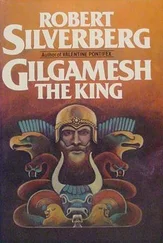Robert Silverberg - Kingdoms of the Wall
Здесь есть возможность читать онлайн «Robert Silverberg - Kingdoms of the Wall» весь текст электронной книги совершенно бесплатно (целиком полную версию без сокращений). В некоторых случаях можно слушать аудио, скачать через торрент в формате fb2 и присутствует краткое содержание. Год выпуска: 1992, ISBN: 1992, Издательство: HarperCollins, Жанр: Фантастика и фэнтези, на английском языке. Описание произведения, (предисловие) а так же отзывы посетителей доступны на портале библиотеки ЛибКат.
- Название:Kingdoms of the Wall
- Автор:
- Издательство:HarperCollins
- Жанр:
- Год:1992
- ISBN:0-246-13719-3
- Рейтинг книги:3 / 5. Голосов: 1
-
Избранное:Добавить в избранное
- Отзывы:
-
Ваша оценка:
- 60
- 1
- 2
- 3
- 4
- 5
Kingdoms of the Wall: краткое содержание, описание и аннотация
Предлагаем к чтению аннотацию, описание, краткое содержание или предисловие (зависит от того, что написал сам автор книги «Kingdoms of the Wall»). Если вы не нашли необходимую информацию о книге — напишите в комментариях, мы постараемся отыскать её.
Kingdoms of the Wall — читать онлайн бесплатно полную книгу (весь текст) целиком
Ниже представлен текст книги, разбитый по страницам. Система сохранения места последней прочитанной страницы, позволяет с удобством читать онлайн бесплатно книгу «Kingdoms of the Wall», без необходимости каждый раз заново искать на чём Вы остановились. Поставьте закладку, и сможете в любой момент перейти на страницу, на которой закончили чтение.
Интервал:
Закладка:
“He said you were.”
“Ah.” She nodded, and I had no doubt of what that gesture meant. Then she turned and beckoned behind her, and another Irtiman came from the ship, and the third one after that. The second one looked male, with a heavy body and a broad dark face, and the third had breasts like the first and flowing hair that was amazingly long and of a startling scarlet color. Both of them had little tubes of metal in their hands. I noticed that the other one, the golden-haired one that had come out first, had a tube of the same sort fastened to her hip. I suppose they were weapons, these tubes. But the golden-haired one gestured to the other two and they put their tubes into little hip-cases like hers.
All three stood facing me. Insofar as I was able to read the meaning of their movements, it seemed to me that they were wary and uneasy. Well, they had good reason to be afraid of us. But they had come out of their ship; that was a sign of trust. One of them—it was the scarlet-haired one—went over to the dead one and knelt and stared into his face for a moment, and then she touched his cheek gently with her hand. She said something to the others, but she was not carrying a speaking-box, so of course I was unable to understand.
“Are you Pilgrims?” the male Irtiman said.
“Yes. There were forty of us when we left Jespodar, and these are all who remain.” I moistened my lips and took a deep breath. “If you know what Pilgrims are, then you must know that we have come here seeking our gods.”
“Yes. We know that.”
“Well, then, is this the Summit? Are the gods to be found on it?”
He looked down at the speaking-box a moment, and ran his hands along its sides as though he needed something to do with them just then. At length he said, somewhat warily, “This is the Summit, yes.”
“And the gods?” My throat was so dry I could barely get the question out.
“Yes, the gods.” A quick tense nod. “This is the place where your gods live.”
I could have wept at those words. My heart surged up in my breast with joy. The darkness of my despair dropped away from me. The gods! The gods, the gods, the gods at last! I looked toward Traiben in triumph, as if to say, See? See? As if to say, I knew all along that the gods must be here; for the Summit is a holy place.
“Where are they?” I asked, trembling.
And the Irtiman pointed, as Traiben had done, to the crevices of the far wall, where the savage Irtimen had run off to hide.
“There,” he said.
It was the most difficult hour of my life. It was like that for us all.
We sat in a circle on the pebbly ground in front of the little metal ship of the Irtimen that had come to rest on that cold flat place at the top of the World, and they told us the bitter truth about our gods.
The dead Irtiman had tried to hint at it, but he could not bring himself to reveal it directly. My father’s father had spoken of it too—the horror at the Summit—but would not tell me what it was. Traiben, of course, had understood it the moment we had attained the Summit. He had dreamed long ago that it was like this here: I remembered now his telling me that. And as for me, I had tried to reject it at every turn, obvious though it may have been. But this time there was no denying the validity of it even for me; for I was at the Summit and I could see with my own eyes what was here and what was not, and the things the Irtimen had to tell us now fell upon me with inexorable unanswerable force.
These were the things I learned from the Irtiman of the Summit at that dark hour. This is what I must share with you for the sake of your souls. Listen and believe, listen and remember.
They said—it was the golden-haired one who did most of the talking, the one who had come out first—that the race of Irtimen was a race that had journeyed everywhere in the Heavens, that traveled between the stars more easily than we went between one village and another. There were many worlds in the Heavens, some beautiful and pleasant, some not. And whatever world they found that had good air and water and things that Irtimen could eat, there they would plant a settlement of their own kind, unless that world was already peopled with its own people and had no room for them.
So it was that they had come to our world, which we call the World; and part of it was fit for Irtiman life and part was not, so they settled only in the part that suited them, here in the heights of Kosa Saag. That was long ago, hundreds of tens of years, more years than I could easily comprehend.
They could not comfortably go into the lowlands, because of the heat and the thick heavy air. And no one from the lowland villages ever came up here, because of the rigors of the journey and the increasing chill and thinness of the air in the higher levels, and because we had no need to venture into such remote difficult places when we had all the richness of the valleys to sustain us. We stayed in our own territory; and indeed we made it unlawful to climb to these heights, saying that Sandu Sando the Avenger had cast us down from them and we were never to return. And so all unknowing we shared the World with the people who had come across the Heavens from Earth; or if we knew anything of the beings who dwelled atop the Wall, we thought of them as gods, or demons, or some such awesome things.
Then the First Climber dared to ascend the Wall—breaking the prohibition against that which existed among our people—and reached the Summit, and encountered the Irtimen. And He was welcomed by them, and taken in, and they spoke with Him and showed Him the wonders of the village they had built up here. And—just as the Book of the First Climber relates—He learned from them the use of fire, and the way to make tools and raise crops and build sturdy buildings, and much else that was useful besides. Which He taught to us when He came down from the Wall, and that was the real beginning of our civilization.
It was the beginning also, the golden-haired Irtiman told us, of the annual Pilgrimage.
For we fell into the custom of sending our best people to the Summit to go before the Irtimen—whom we came to think of as gods, though in truth they were only mortal Irtimen—and pay homage to them, and learn such things from them as we still needed to know, and bring that knowledge back to the lowlands the way the First Climber had done. The journey was a long and difficult one, and only a few who attempted it survived to reach the Summit, for there were many perils along the way, and especially the thing called change-fire that the mountain gives off, which tempts us to alter our bodies beyond recognition; and of those who avoided the dangers of the Wall and did attain the Summit, just the merest handful ever returned. But to make a successful Pilgrimage was a great achievement, and those who managed it attained the highest honors we could bestow. So we contended amongst ourselves for the right to undertake the journey, and whenever any of us attained the Summit they were greeted warmly by the Irtimen, who taught them many valuable things as they had done for the First Climber.
That was a hard thing to swallow, that our beloved gods were mere mortals, strangers from some other world clinging to a precarious hold at the Summit because they were too feeble to go down into the lowlands. And that the First Climber whom we all revered had been so simple as to fall down before those strangers and offer them homage as if they were divine, and to perpetuate the obligation of that homage down through all the generations that followed Him. It was like gulping down lumps of hot metal, to accept those things as fact.
But there was worse, much worse, to come.
Time passed, said the golden-haired Irtiman, and things changed in the village at the Summit. For now she spoke of the thing we call change-fire. There are forces at work on Kosa Saag, said the Irtiman, natural forces, which cause living flesh to ebb and flow into strange new forms, bringing about bodily transformations far more startling than anything we of the lowland villages can achieve. So she confirmed what we had already come to believe, that the transformations on the Wall were brought about by the nature of the Wall itself. It was not magic that had created the Kingdoms and their dwellers, nor any decree of the gods; it was done by the work of physical forces. The prime one, she said, confirming our own belief, was change-fire, that is, a kind of secret light that the rock itself gives off; but she said that that was only one of many factors that brought about bodily change on this mountain. There was also the thinness of the air, which allowed the harsh light of Ekmelios to penetrate the loins of the Irtimen settlers and alter their seed. And also it was the water they drank; and also it was something in the soil. All these qualities of the Wall brought about great change in the course of time for the Irtimen who dwelled at the Summit. They underwent a strong and terrible transformation, these visitors from the stars. “Their minds grew dim,” she said. “Their bodies became deformed. They lost their knowledge. They turned into beasts.”
Читать дальшеИнтервал:
Закладка:
Похожие книги на «Kingdoms of the Wall»
Представляем Вашему вниманию похожие книги на «Kingdoms of the Wall» списком для выбора. Мы отобрали схожую по названию и смыслу литературу в надежде предоставить читателям больше вариантов отыскать новые, интересные, ещё непрочитанные произведения.
Обсуждение, отзывы о книге «Kingdoms of the Wall» и просто собственные мнения читателей. Оставьте ваши комментарии, напишите, что Вы думаете о произведении, его смысле или главных героях. Укажите что конкретно понравилось, а что нет, и почему Вы так считаете.












